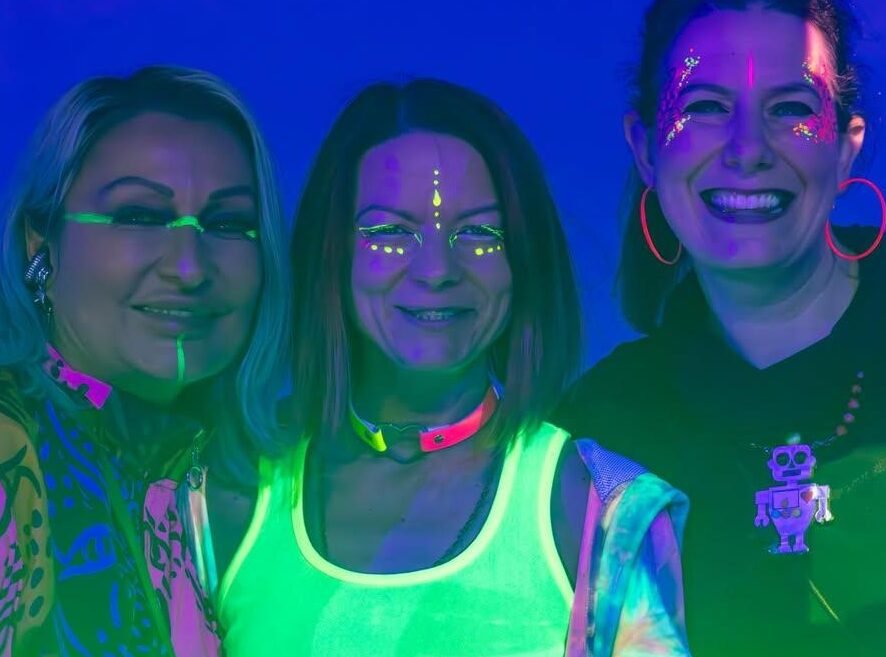The UV glow party at Aures, SE1 was one of the friendliest, most welcoming club nights I’ve attended. No posing, no sneering, no sleaze, just overwhelming warmth.
The good news is that there are more nights to come.
Admittedly, now in my 7th decade, I’m not a frequent raver. But even guests who’ve been raving solidly for decades, rated the vibe. “Best I’ve been to in 10 years,” said one hardened party-goer.
The party was organised for the launch of the Ouroboros Foundation, which funds legal research into the use of psychedelic treatments for mental health – more on that shortly.
But first, there are two declarations I should make upfront. One, this review is horribly late: the launch party was 14 December last year. Illness and Christmas prevented a review going up sooner. Two, Justin Wood, Ouroboros founder, is married to my niece, Zephyr.
Party crew
The DJs keeping the night of some 250 people dancing were Miss Vegas, Medusa, Alexandra, Ebru Al, featuring guitarist Soul Scientist and DJ Traffik in the headline spot.

The DJs were joined by aerial hoop performers Maia and Calyx Lunina, UV fairy queens Amanda Perry, Naddy Sane and Magda Durka, and UV face and body paint artists Vivi Lara, Lana Curtis and Rachael Jane Burroughs.
250 is a good number for Aures, an enclosed brick arch under the railway from Waterloo mainline. It can accommodate up to 350, so the night was cosy without becoming a jam-packed sweatbox (yeah, I know some of you like it that way).
All the crew – DJs, musicians and other performers, all gave their Saturday night for free.
“I reckon we succeeded in all aspects,” said Justin, when I spoke to him, recovering from flu in the new year. “We had people there from their 20s to 80s. They loved the music even if they’re not into the genre.”
Fund raising
Did Ouroboros raise much money for research? “Low hundreds”, reckons Justin. But there will be other nights at cheaper venues. And other fundraising events are planned – first in London, where the Foundation can guarantee to sell out, then in other urban areas – Manchester, Bristol etc.
If raves seem an unlikely way to raise money for medical research, there is a logical reason. “The rave scene has experience of psychedelics, so it’s an obvious sympathetic audience,” explains Justin.
Parties are fun. But Justin and the Ouroboros Foundation are serious.
Justin is a prison nurse in Devon. “I witness the devastating effects of poorly treated mental health issues every day,” he says.
On 1 September 2024, Justin and Zephyr were the first to respond to a neighbour’s suicide.
Zephyr is studying for a masters in psychology, specialising in the use of psychedelics, so Justin already had access to the best academic research.
Ouroboros website and Facebook presence was live 3 days after they witnessed their neighbour’s suicide.
Justin has gathered 1700 friends, a formidable UK list of sympathetic folk, many professionals, such as DJs and performers, as well as marketing and events people.
Ouroboros’ next events are likely to be at Breaking Convention, University of Exeter.
“Our mission is to create a long-term funding engine for psychedelic research for treating mental health issues,” says Justin. “We organise immersive parties, raves, raffle events and crowdfunding initiatives. Techno and psytrance are at the core of our activities and events.”
Research grants
When the fund gets to £25,000, the Foundation will make a grant to a UK PhD student researching psychedelics for mental health.
Ouroboros is currently a Community Interest Company. The UK authorities like you to run a CIC for 2 years before it can become a fully fledged charity. “In the long term we aspire to establish a philanthropic foundation” says Justin.
Research into psychedelics is no longer a niche area. There are long-established programmes on both sides of the Atlantic for treating depression, PTSD and addiction and more, including a recent call for volunteers to test DMT for reducing alcohol consumption from University College London.
Note the DJ line up for the Ouroboros launch party was mostly female.
“We want to promote female DJs. I think it changes the vibe of the evening,” says Justin.
If the Aures night was anything to go by, it does. And it’s a welcome change.